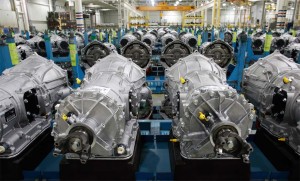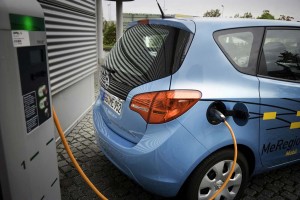General Motors will launch a battery car test program in Germany using a fleet of its small Opel Meriva hatchbacks.
The latest in a series of “electrification” efforts by the Detroit-based maker, it teams GM up with the German government-backed MeRegioMobile program. The program is designed to not only test the practicality of battery cars – and their acceptance by consumers – but also to see how the energy infrastructure can be adapted to meet the needs of electric mobility.
In a separate development, GM is announcing plans to invest $23.5 million to expand the production of battery vehicle components at a factory in Baltimore, Maryland. GM earlier announced it will use the Baltimore Transmission Plant to produce motors for electric vehicles – the first such operation run by a major automaker in the U.S.

GM is investing another $23.5 million at a Baltimore plant to ramp up production of battery-car components.
GM will join the German MeRegioMobile program “to study the practicality, user friendliness and acceptance of electric cars among consumers,” said Rita Forst, Vice President of Engineering at Opel.
The program, she added, is “making an important contribution to the definition of European standards for energy infrastructure, electricity saving technology and data communications.”
While GM has offered a number of conventional hybrids, in recent years, it is just starting to venture into the more advanced world of battery vehicles. Its first offering will be the Chevrolet Volt, which it prefers to call an extended-range electric vehicle. Even after its batteries run down Volt will be able to keep driving by using an onboard gasoline-powered generator to run its electric motors. An Opel version of the E-REV, dubbed Ampera, will follow next year. And other versions are reportedly under development, including possible pure battery-electric offerings.
GM has announced plans to form a Volt Consumer Advisory Board (Click Here for more) to test the way potential buyers will operate – and react to – the plug-in sedan.
But while the question of consumer acceptance is critical to the industry’s plans to vastly expand the availability of battery cars, there is also the challenge of gearing up the global power infrastructure. EV advocates hope to see most battery car owners charge up overnight, when there is a glut of capacity. But even then, that will require updating the grid to maximize its potential.
Among other things, the goal is to make it possible for individual battery cars to talk to the grid to find out when it is best to beginning charging. (Click Here for a report on the $5-billion investment likely needed to create a smart grid that can support the anticipated battery car boom.
Along with GM’s Opel subsidiary, participants in the MeRegioMobile program include Daimler, Bosch and the Fraunhofer Institute for Systems and Innovation Research. Various energy partners are building a network of chargers in Germany’s Baden-Wurttemburg region.
The Meriva EV will be capable of plugging into Europe’s standard 220-volt electric system. But the little hatchbacks will also have the opportunity to get a quick charge in as little as an hour at designated 440-volt stations.
“We are testing charging at high currents in less than one hour, as well as the communication protocols between vehicle and charging station,” Forst said.
The 4-seat test car will have an 82 horsepower electric motor powered by a 16 kilowatt-hour lithium-ion battery pack. That is expected to give it about 40 miles of range and a top speed of just over 80 mph.
For the moment, at least, the Opel executive says the Meriva EV “is a pure research vehicle,” with no plans for production.
But there is little doubt that GM expects to continue expanding its battery car line-up, as the Baltimore investment underscores.
“This will allow us to strengthen our core electrification components expertise,” said GM Manufacturing Manager Arvin Jones, leaving an open hint that, “We’ll have more to say about specific products later.”

